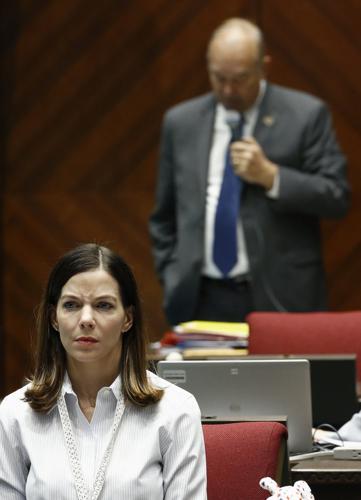PHOENIX — The attorney for Don Shooter charged Wednesday that House leaders are illegally trying to hide the notes of investigators who prepared the report that led to his ouster on charges of sexual harassment.
Kraig Marton told Maricopa County Superior Court Judge Bruce Cohen that his client is entitled not just to the final report on the investigation but also to everything, from the notes and interviews the outside investigators compiled to any earlier drafts of the report.
“You don’t get to take down a man and make it very public and hide behind the privilege as if that somehow is OK,” Marton said.
But Gregory Falls, who represents the House and the two attorneys hired by Speaker J.D. Mesnard to conduct the probe, argued to Cohen that Shooter got everything he was entitled to: the 86-page report and more than 300 pages of supplemental findings, all of which were made public.
Anything else, Falls said, is legally exempt from disclosure under either the attorney-client privilege or the concept that a lawyer’s “work product” is protected.
And Cohen indicated he sees another potential problem in what Shooter and Marton want him to order the House and its investigators to release.
He said it would be one thing if the former Republican lawmaker from Yuma had sued the House accusing the chamber of acting illegally in voting earlier this year 57-3 to eject him. At that point, Cohen said, the information that was used by House investigators to conclude Shooter was guilty of sexual harassment might be relevant.
Shooter has filed a $1.3 million claim — a formal precursor to litigation — against the House. But to date he has not actually brought a lawsuit.
But this case, Cohen noted, stems from a separate civil lawsuit filed against Shooter by Rep. Michelle Ugenti-Rita, R-Scottsdale, one of the people the investigative report concluded was a victim of Shooter’s harassment.
Her lawsuit charges that Shooter is guilty of slander, libel, battery and negligence. Shooter, in turn, filed a counterclaim accusing Ugenti-Rita of defamation.
That, the judge suggested, makes whatever the House investigators have legally irrelevant to this current lawsuit.
But Marton argued that the report prepared by the private attorneys hired by the House formed the basis for Ugenti-Rita’s suit against Shooter.
In fact, he told the judge, some of the claims in her lawsuit are virtual carbon copies of the conclusions the investigators reached.
That, he said, makes Shooter’s ability to see what led to the final report relevant as a matter of fairness and justice.
“Whether the state is a party (to this lawsuit) makes no difference,” Marton told the judge.
Shooter was voted out of the House by his colleagues after the investigative report commissioned by the House found “credible evidence” Shooter violated anti-harassment policies several times with Ugenti-Rita, including making sexual comments and suggestions and making “unwelcome sexualized comments” about her breasts.
But the investigator also found incidents of harassment and improper conduct or comments involving others, including a lobbyist, a newspaper staffer and the former publisher of the Arizona Republic.
Falls did not dispute that some of the issues in this latest lawsuit are the same as the ones raised in the report given to House members when they voted to oust Shooter.
But he said that if Shooter contends that Ugenti-Rita’s claims have no legal basis, he remains free to go out and do exactly what the investigators did: interview witnesses.
Falls said there is no reason for House investigators, both of whom are lawyers, to have to give up their notes to make Marton’s job easier.
Marton, however, said it’s not that simple.
He said the final report cites several anonymous witnesses. And without access to who they are — and what they said — Marton said Shooter cannot defend himself in this lawsuit.
And there’s something else. Marton contends that what was finally made public is different than some earlier drafts that were shared with some people in the House.
“We are credibly advised that the first draft found Miss Ugenti-Rita guilty of misconduct, the later draft does not,” he said.
“That is directly relevant to this case, that is directly relevant to what we want to see,” Marton continued. “When they make a public report that says he’s guilty and she’s not, I’d like to know what they said before.”
Mesnard originally had pushed only that Shooter be censured. But he successfully pushed for expulsion after Shooter sent a letter to colleagues asking they delay any action while they consider whether charges also should be brought against Ugenti-Rita.
One of the issues is whether Ugenti-Rita was complicit in sending what the report described as “unsolicited, sexually explicit communications” to someone who is believe to be a former female staffer. The report described these as “egregious and potentially unlawful acts.”
But the report also says that Brian Townsend, a former House staffer to whom Ugenti-Rita used to be engaged, accepted sole responsibility for sending these out and the matter was not pursued.
Shooter contends the details of what the attorneys learned – and the pictures themselves — were in early versions of the report but excised before its release.
After his ouster, Shooter made a bid in August to get elected to the state Senate. But he came in third in the three-way Republican primary.





